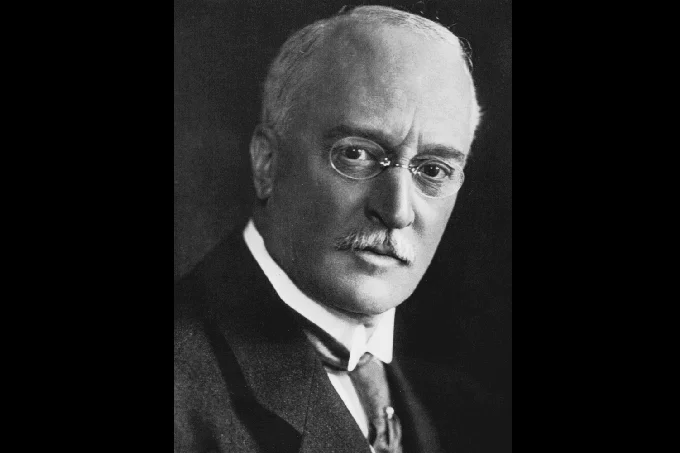The mysterious death of Rudolf Diesel

The last September day of 1913 was drawing to an evening. There were only a few minutes left before the start of the next regular voyage of the Dresden steamer from Antwerp to England. Three passengers stood apart on the upper deck. Two of them – Georg Grace and Alfred Lukmann – have already registered in the passenger log, and the third – Rudolf Diesel – for some reason did not do it. Maybe he hoped for his fellow travelers or just forgot?
When the lights of the port disappeared in the evening haze, all three went to the restaurant, where they continued the conversation. Engineer Diesel told fellow travelers about his wife, then about the invention. His interlocutors were more interested in politics, in particular, the activities of Lord Admiralty Winston Churchill, who advocated a radical modernization of the British fleet. The conversation also touched on the heated international relations, the specter of a great war looming more and more clearly. This topic was on the lips of many at that time, because the first hotbed of war was already burning in the Balkans.
About ten o’clock in the evening Rudolf Diesel bowed to his new acquaintances and went down to his cabin. Before opening the door, he stopped the steward and told him to wake him up early in the morning – at a quarter past six. Then, in the cabin, he took his pajamas out of the suitcase and put them on the bed.
He hung a pocket watch on a chain on the wall next to it. Then…
Nobody knows what Diesel did afterward. It is only known that in the morning at 6.15 the steward tried to wake up the passenger, knocked on the door for a long time, but to no avail. Then he opened the door and saw an unmade bed, pajamas on it, and a clock on the wall of the cabin. Soon the watchman found the inventor’s hat and cloak on the deck. He himself was nowhere to be found. The Dresden raised the alarm. The captain immediately interviewed the sailors who were on night watch. But nothing could be found out about the missing engineer – no one saw passengers on the decks at night.
Later, an attempt was made to restore the picture of the incident. Many passengers and crew members were interviewed. First of all, Georg Grace and Alfred Lukmann were interrogated, who spoke in great detail about their evening conversation with Diesel. They also reported that he was talkative and in a good mood. Both of these gentlemen had a reputation for solid people, and there was no reason to doubt their testimony. The steward was interrogated for a long time, but the frightened young man repeated again and again what he had said at the very beginning: the passenger asked him to wake him up, but in the morning he was not in the cabin.
The news about the disappearance of Rudolf Diesel hit the pages of the press. At first, a version was expressed that the inventor was the victim of an accident. Allegedly, Diesel has been on the verge of a nervous breakdown in recent months and suffered several heart attacks. With the ardor of eyewitnesses, reporters described how the inventor, in order to somehow cope with insomnia, went on deck to get some fresh air, and there he had a heart attack – the inventor leaned on the railing, lost his balance, and fell overboard. No one noticed it at night.
But this version was immediately refuted. Firstly, Diesel’s attending physician stated that no heart ailments plagued his patient. Secondly, the captain of the Dresden made a decisive refutation: the height of the railing on the steamer is more than a meter, and any accident due to negligence is excluded. Maybe the missing passenger was drunk? But everyone who knew Diesel said with one voice: absurd, the inventor did not take alcohol in his mouth!
A different version appeared in the newspapers: suicide. Diesel, they say, was threatened with bankruptcy, complete ruin. Krupp financed his research and experimental work, having invested a lot of money in this enterprise. And now it’s time to pay the bills…
But this version was also seriously questioned since Krupp received a monopoly right to use Diesel inventions in Germany. And the inventor himself, according to relatives and acquaintances, did not experience financial difficulties. Okay, the supporters of this version agreed, even if not bankruptcy, but you never know what reasons there may be for suicide! Perhaps Diesel had some secret that no one knew about…
Opponents objected: if it was suicide, then how to explain Diesel’s behavior a few hours before his death? He was in a good mood all evening, was talkative, even joking. Then why did you prepare night pajamas? And the clock on the cabin wall? Why did he ask the steward to wake him up at a certain time? Is this how a person who has decided on a desperate act behaves? And it is unlikely that he would have passed away without even leaving a farewell note to his loved ones, those whom he loved so dearly.
It’s strange, but for some reason, at first, no one was worried about the question: why, in fact, Rudolf Diesel went to England, and what was he going to do there? Only when it was time to think about it, a third version arose: Diesel was killed because he was going to sell his patent to the British. English expressed this hypothesis, and then American journalists. For example, the magazine “New York World” in 1915 wrote: “The elimination of the creator of a fundamentally new engine looks like an accusation of treason to the fatherland. On the other hand, the goal was to keep the secret of the engine needed for submarines. The inventor was thrown overboard so that the patent would not get to the British…”
The version of the murder seems to be the most plausible and logical. This was noted in his memoirs by Winston Churchill, who during the last voyage of Diesel was the first lord of the Admiralty and made great efforts to modernize the British fleet. It can be assumed that it was Churchill who initiated the German engineer’s trip to London.
Of course, the trip to England of the inventor of a promising engine could not go unnoticed in Germany, preparing for war. As a result, an agent or agents of the Kaiser’s secret police were instructed to eliminate the “traitor”. The raffled version of the “action” was apparently recognized as the most optimal: the inventor was thrown into the sea. The hat and raincoat left on the deck were supposed to support the suicide theory. The inventor was declared missing, and in order to put the investigation on the wrong track, they came up with a version of suicide.
It is strange that the role of the inventor’s fellow travelers, Messrs. Grace and Luxmann, was not thoroughly clarified. And can we be sure that none of the Dresden crew really saw anything strange at night? However, who was responsible for the investigation of this criminal incident? Incidents that occurred on the high seas on a German passenger ship…
And almost a year later, in July 1914, the First World War began. This pushed into the background the mystery of the disappearance of Rudolf Diesel…




